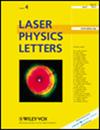Measurement-free mediated semi-quantum key distribution protocol based on single-particle states
IF 1.4
4区 物理与天体物理
Q3 OPTICS
引用次数: 0
Abstract
A novel measurement-free mediated semi-quantum key distribution (MSQKD) protocol is proposed based on single-particle states. It enables two classical users to establish a secret key with the assistance of a third party. This protocol simplifies the third party’s role to solely generating qubits in X-basis and conducting Bell measurements. A distinctive feature of this protocol is the efficient grouping and reordering of qubits by the classical users with a minimum of three delay lines. Security analyses demonstrate that the protocol can withstand various attack strategies, including collective attack, measurement attack, fake state attack, and modification attack. The noise tolerance is given by deriving a lower bound of the protocol’s key rate in the asymptotic scenario. Simulations on the IBM Quantum Experience platform are conducted to illustrate the feasibility of this protocol. Compared with existing MSQKD protocols, the proposed protocol consumes fewer quantum resources and achieves a qubit efficiency of 1/8.基于单粒子状态的免测量介导半量子密钥分发协议
本文提出了一种基于单粒子状态的新型免测量介导半量子密钥分配(MSQKD)协议。它能让两个经典用户在第三方的协助下建立密钥。该协议简化了第三方的角色,使其只需在 X 基础上生成量子比特并进行贝尔测量。该协议的一个显著特点是经典用户对量子比特进行高效分组和重新排序,延迟线最少为三条。安全性分析表明,该协议可以抵御各种攻击策略,包括集体攻击、测量攻击、伪造状态攻击和修改攻击。通过推导出渐进情况下协议密钥率的下限,给出了噪声容忍度。在 IBM 量子体验平台上进行的仿真说明了该协议的可行性。与现有的 MSQKD 协议相比,该协议消耗的量子资源更少,量子比特效率达到 1/8。
本文章由计算机程序翻译,如有差异,请以英文原文为准。
求助全文
约1分钟内获得全文
求助全文
来源期刊

Laser Physics Letters
物理-仪器仪表
CiteScore
3.30
自引率
11.80%
发文量
174
审稿时长
2.4 months
期刊介绍:
Laser Physics Letters encompasses all aspects of laser physics sciences including, inter alia, spectroscopy, quantum electronics, quantum optics, quantum electrodynamics, nonlinear optics, atom optics, quantum computation, quantum information processing and storage, fiber optics and their applications in chemistry, biology, engineering and medicine.
The full list of subject areas covered is as follows:
-physics of lasers-
fibre optics and fibre lasers-
quantum optics and quantum information science-
ultrafast optics and strong-field physics-
nonlinear optics-
physics of cold trapped atoms-
laser methods in chemistry, biology, medicine and ecology-
laser spectroscopy-
novel laser materials and lasers-
optics of nanomaterials-
interaction of laser radiation with matter-
laser interaction with solids-
photonics
 求助内容:
求助内容: 应助结果提醒方式:
应助结果提醒方式:


